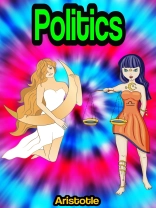Politics by Aristotle (Greek: Πολιτικά,
Politiká) is a work of political philosophy by Aristotle, a 4th-century BC Greek philosopher.
The end of the
Nicomachean Ethics declared that the inquiry into ethics necessarily follows into politics, and the two works are frequently considered to be parts of a larger treatise—or perhaps connected lectures—dealing with the ‘philosophy of human affairs’.
The title of
Politics literally means ‘the things concerning the πόλις : polis’, and is the origin of the modern English word politics.
In the first book, Aristotle discusses the city (πόλις :
polis) or ‘political community’ (κοινωνία πολιτική :
koinōnía politikē) as opposed to other types of communities and partnerships such as the household (οἶκος : oikos) and village.
The highest form of community is the polis. Aristotle comes to this conclusion because he believes the public life is far more virtuous than the private and because men are ‘political animals’. He begins with the relationship between the city and man (I. 1–2), and then specifically discusses the household (οἶκος :
oikos) (I. 3–13).
He takes issue with the view that political rule, kingly rule, rule over slaves and rule over a household or village are only different in size. He then examines in what way the city may be said to be natural.
Aristotle
Politics [EPUB ebook]
Politics [EPUB ebook]
Achetez cet ebook et obtenez-en 1 de plus GRATUITEMENT !
Langue Anglais ● Format EPUB ● ISBN 9791221356359 ● Taille du fichier 0.3 MB ● Maison d’édition Memorable Classics eBooks ● Publié 2022 ● Téléchargeable 24 mois ● Devise EUR ● ID 8433122 ● Protection contre la copie sans







![Couverture du Brian Schrag & Julisa Rowe: Community Arts for God's Purposes [Chinese] 貼近神心意的社群藝術 Couverture du Brian Schrag & Julisa Rowe: Community Arts for God's Purposes [Chinese] 貼近神心意的社群藝術](https://static.worldofdigitals.com/thumb_webp/740/9781645083740.webp)




